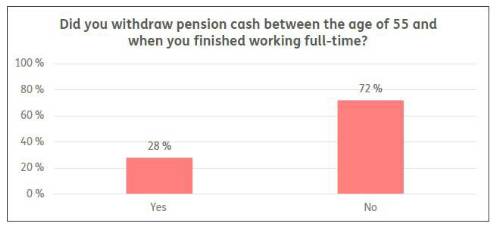Nearly three in 10 retirees (28%) over the age of 55 said that that they had withdrawn money from their pension before they retired. Almost a third (32%) of this group said they needed the income to bridge the gap to State Pension age or because of redundancy or lower earnings, and more than half (52%) said that they had retired sooner than they had expected.

Stephen Lowe, group communications director at retirement specialist Just Group, said: “Our research shows about one-third of over-55s took pension money before giving up work - some because they wanted to and some because they needed to.
“It seems that accessing pensions before retiring from full-time work is helping significant numbers of people cope with rising day to day living costs and sudden or unexpected events such as redundancy or ill-health.
“Around 45% of those withdrawing pension cash before leaving work said it was simply to take tax-free cash, but a significant minority of about a third are doing it to supplement their income.
“Whether taking pension money before retiring is a good or bad decision depends on people’s individual circumstances, but it’s important to remember that pension money taken and spent before retirement will not be available to provide income later in life.”
He encouraged those considering using pension cash before retirement to get them through a difficult situation, such as redundancy or illness, to take a moment and consider if it really is the best – or only – option.
A good place to start is first to check whether State Benefits might be available to provide extra income. If people do decide to make any lump sum withdrawals from their pension then they should work out how to do that in the most tax-efficient way.
“When times are tough the pension pot can look like an easy solution to an immediate problem – but it’s important that isn’t the default solution,” he said. “People may well have other options and it’s important they’re fully aware of all the choices available to them and that they understand how decisions made now are likely to impact their lives 10, 20 or 30 years down the line.
“We would urge all those considering their pension options to take advantage of the government’s free, independent and impartial guidance service Pension Wise, which can give a helpful overview of available options in the run up to and at retirement.”
There are a range of resources to provide information and guidance:
• Free, impartial and independent guidance is available to retirees through the government-backed Pension Wise - https://www.moneyhelper.org.uk/en/pensions-and-retirement/pension-wise
• Organisations such as the MoneyHelper and charities such as Citizens Advice and Age UK can be good sources of assistance.
• Professional advisers will charge but can provide regulated advice alongside information about benefit eligibility.
|

